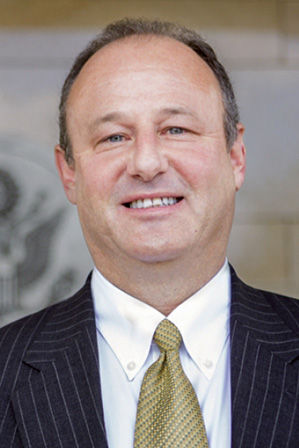Women’s Reproductive Health Must Be a Priority
President’s Views
BY ERIC RUBIN

I have written and spoken many times about a growing sense that obstacles, hardships and challenges are increasingly making it hard for many of our dedicated and talented colleagues to stay in the Service and continue serving our country as our first line of defense at home and abroad.
It has never been easy to serve, and the Foreign Service has never asked that it be so. In fact, what we hear more and more from our members is their hope that they will be allowed to take on more sensible, pragmatic risk in their efforts to serve effectively and to accomplish the mission they have undertaken for our country.
Our colleagues must know that someone has their backs when they are serving overseas in difficult and sometimes dangerous assignments and that someone understands what it is like to deal with the challenges of service. That “someone” has to be the U.S. government agencies that employ members of the Foreign Service: their leadership and our fellow employees who provide support and protection.
So it was with great concern and, frankly, sadness that The Foreign Service Journal published a Speaking Out column in May by an active-duty member representing more than 200 Foreign Service officers who signed a letter calling on the State Department to provide equal access to essential women’s reproductive health services overseas.
The letter and column detail examples of failures of the State Department to assist employees facing medical emergencies, from someone “suffering a nearly fatal ectopic pregnancy” to another “suffering a miscarriage at one of the most polluted posts in the world.” Another FSO, serving in a country where abortion is illegal, was “referred by the Medical Unit to illegal local providers.”
The authors say that State’s Bureau of Medical Services “actively and repeatedly forced patients into impossible decisions and significant financial burden, and put them in life-threatening situations.” They state: “Diplomats representing America in countries across the world are denied access to the same services that are legal and readily available in the country we represent and are told, ‘You are on your own.’ We will no longer stand for this.”
It was also very worrying that the 200-plus members who signed the letter to State’s leadership did not receive even a courtesy response for more than four months—in fact, not until we sent an advance copy to State MED and published the column.
AFSA does not get involved in political issues. We recognize that our agencies are bound by the restrictions of the Hyde Amendment (barring the use of federal funds to pay for abortion, except under certain circumstances) and other legislation on the books. We expect, however, that our agencies will do their utmost within the law to support, protect and care for colleagues who face health problems and dangers.
State MED has promised an expeditious review of the situation and improvements in areas that can be addressed within the law. That is good, but overdue. When more than 200 colleagues write to our agencies’ leadership expressing anguish and concern and asking for a change in the way they are treated, clearly there is a problem that must be addressed.
FS members posted to developed countries with excellent health care can turn to local resources for care, while members serving in countries without adequate medical services cannot. They all need to know that our government has their backs and will help them get the care they need.
Money cannot be an excuse. Women’s health is a human right and a Foreign Service right. “In the Biden-Harris administration, the empowerment and protection of women and girls, including promoting their sexual and reproductive health and rights, is a central part of U.S. foreign policy and national security,” U.S. Secretary of State Antony Blinken said in a statement during the administration’s first week in office in 2021.
We expect the Biden administration to follow its public commitments and the law, and to take care of our colleagues who are putting their lives and health on the line in service to our country.

